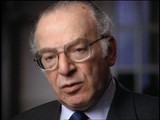
Oral History
Browse an alphabetical list of survivors’ oral histories. These interviews describe firsthand accounts and personal experiences during the Holocaust and World War II.
<< Previous | Displaying results 11-20 of 20 for "Oral History" | Next >>
-
Norbert I. Swislocki describes leaving Warsaw with his mother upon the outbreak of war
Oral HistoryNorbert was 3 years old when Germany invaded Poland in September 1939. He and his mother were in Warsaw; his father had been drafted into the Polish army and later ended up in Vilna. Norbert and his mother set out to join him and the family was reunited after a few months. After the family had been in Vilna for about a year, Norbert's father was able to obtain visas for Curacao in the Dutch West Indies and visas for transit through Japan. Norbert and his parents left Vilna in January 1941, and arrived in…

-
Norbert J. Yasharoff describes the change in living conditions for Jews in Bulgaria
Oral HistoryAnti-Jewish measures took effect in Bulgaria after the beginning of World War II. In March 1941, Bulgaria joined the Axis alliance and German troops passed through Sofia. In May 1943, Norbert and his family were expelled to Plevin in northern Bulgaria, where they stayed with relatives. After the advance of the Soviet army in 1944, Norbert and his family returned to Sofia.
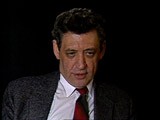
-
Norbert J. Yasharoff describes the trial and sentencing of a Jewish man falsely charged with economic crimes
Oral HistoryAnti-Jewish measures took effect in Bulgaria after the beginning of World War II. In March 1941, Bulgaria joined the Axis alliance and German troops passed through Sofia. In May 1943, Norbert and his family were expelled to Plevin in northern Bulgaria, where they stayed with relatives. After the advance of the Soviet army in 1944, Norbert and his family returned to Sofia.
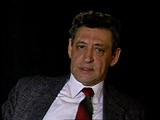
-
Norbert Wollheim describes a roundup of Jews in Berlin
Oral HistoryNorbert studied law and was a social worker in Berlin. He worked on the Kindertransport (Children's Transport) program, arranging to send Jewish children from Europe to Great Britain. His parents, who also lived in Berlin, were deported in December 1942. Norbert, his wife, and their child were deported to Auschwitz in March 1943. He was separated from his wife and child, and sent to the Buna works near Auschwitz III (Monowitz) for forced labor. Norbert survived the Auschwitz camp, and was liberated by US…
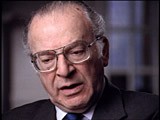
-
Norbert Wollheim describes departure of Kindertransporte (Childrens' Transports) from Berlin, and the separation of children from their parents
Oral HistoryNorbert studied law and was a social worker in Berlin. He worked on the Kindertransport (Children's Transport) program, arranging to send Jewish children from Europe to Great Britain. His parents, who also lived in Berlin, were deported in December 1942. Norbert, his wife, and their child were deported to Auschwitz in March 1943. He was separated from his wife and child, and sent to the Buna works near Auschwitz III (Monowitz) for forced labor. Norbert survived the Auschwitz camp, and was liberated by US…
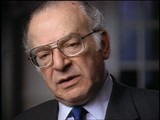
-
Norbert Wollheim describes deportation from Berlin
Oral HistoryNorbert studied law and was a social worker in Berlin. He worked on the Kindertransport (Children's Transport) program, arranging to send Jewish children from Europe to Great Britain. His parents, who also lived in Berlin, were deported in December 1942. Norbert, his wife, and their child were deported to Auschwitz in March 1943. He was separated from his wife and child, and sent to the Buna works near Auschwitz III (Monowitz) for forced labor. Norbert survived the Auschwitz camp, and was liberated by US…
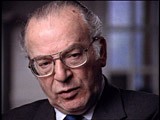
-
Norbert Wollheim describes forced labor at the Buna works
Oral HistoryNorbert studied law and was a social worker in Berlin. He worked on the Kindertransport (Children's Transport) program, arranging to send Jewish children from Europe to Great Britain. His parents, who also lived in Berlin, were deported in December 1942. Norbert, his wife, and their child were deported to Auschwitz in March 1943. He was separated from his wife and child, and sent to the Buna works near Auschwitz III (Monowitz) for forced labor. Norbert survived the Auschwitz camp, and was liberated by US…
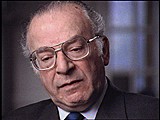
-
Norbert Wollheim describes his experiences on a transport during deportation from Berlin
Oral HistoryNorbert studied law and was a social worker in Berlin. He worked on the Kindertransport (Children's Transport) program, arranging to send Jewish children from Europe to Great Britain. His parents, who also lived in Berlin, were deported in December 1942. Norbert, his wife, and their child were deported to Auschwitz in March 1943. He was separated from his wife and child, and sent to the Buna works near Auschwitz III (Monowitz) for forced labor. Norbert survived the Auschwitz camp, and was liberated by US…
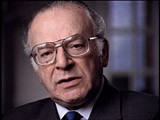
-
Norbert Wollheim describes his liberation at Schwerin, in northeast Germany, in May 1945
Oral HistoryNorbert studied law and was a social worker in Berlin. He worked on the Kindertransport (Children's Transport) program, arranging to send Jewish children from Europe to Great Britain. His parents, who also lived in Berlin, were deported in December 1942. Norbert, his wife, and their child were deported to Auschwitz in March 1943. He was separated from his wife and child, and sent to the Buna works near Auschwitz III (Monowitz) for forced labor. Norbert survived the Auschwitz camp, and was liberated by US…
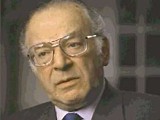
-
